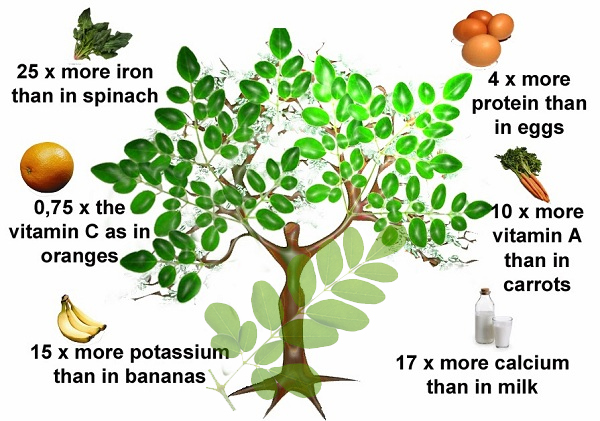Moringa tree, also known as ‘the Tree of Life’ is a plant with a variety of medicinal uses and extraordinary nutritional importance. The nutritional value and the incredible health benefits of this tree have been recognized and used in many cultures in different parts of the world for thousands of years.
This phenomenal plant is native to northern India, the Himalayan region, Pakistan, Arabia and Africa, and it is also known as drumstick tree. Moringa tree is packed with high levels of minerals, vitamins, proteins, beta-carotene, and amino acids.

Additionally, Moringa is abundant in quercetin and other antioxidants which give this plant antipyretic, antispasmodic, diuretic, antibacterial, anti-inflammatory and antifungal properties. (Source)
Every part of the Moringa tree is edible. Moringa leaves can be consumed either in a fresh salad, drinks or steamed. Its flowers are rich in calcium and potassium and are very delicious and nutritious.
The fruits of the Moringa tree can be consumed raw or cooked as green beans or peas, while fully grown fruits are usually best fried.
Table of Contents
Moringa Seeds
Moringa seeds are used in treatment for cramps, sexually transmitted diseases, arthritis, rheumatism, gout and boils because of their antibiotic and anti-inflammatory properties. The seed can also be used as a relaxant for epilepsy. Moringa seeds contain strong antibiotic and fungicide compounds, so they are effective against skin-infecting bacteria. As a balm, the seeds ought to be roasted, pounded, mixed with coconut oil and applied to the infected area.
Moringa Flowers
For improving the flow and the quality of the milk in breastfeeding women, the juice of Moringa flowers can be most beneficial. The juice of Moring flowers it’s also useful for urinary problems as it stimulates urination. Boiled Moringa flowers prepared as tea is a perfect cold remedy.
Moringa Leaves
Moringa leaves are high in protein and have abundant dietary fiber content which makes them a perfect help for patients suffering from malnutrition. But they also have strong and potent medicinal properties in treating fever, ear, and eye infections, bronchitis, gastric ulcers, and diarrhea.
The leaves are high in iron and are helpful in the treatment of anemia. They can also cure headaches when rubbed onto the temples, and because of the anti-inflammatory properties can relieve and ease the pain and inflammation caused by insect bites.
